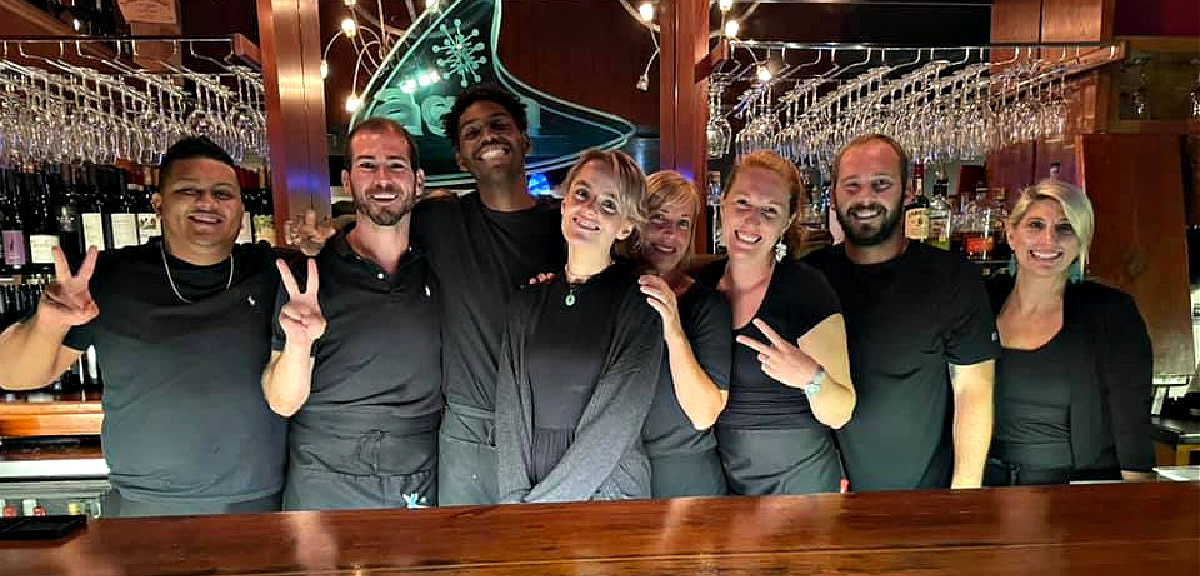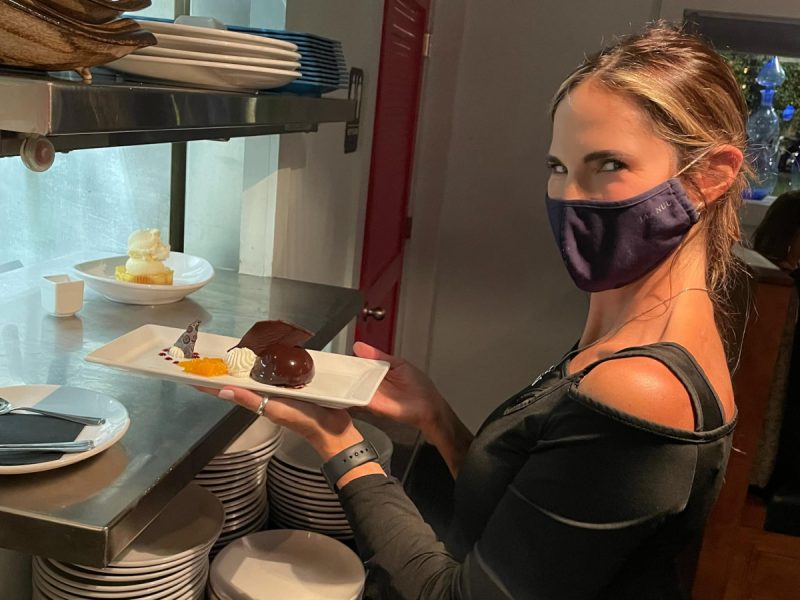 Image courtesy of Aqua Restaurant
Image courtesy of Aqua RestaurantFive years later, and we are still feeling the effects.
Updated March 5, 2025 – The anniversary of the COVID-19 pandemic is a sobering reminder of the hardships so many have endured. From the lasting financial strain on restaurants to the emotional toll on hospitality workers, the challenges are real—and ongoing. But now, more than ever, we have an opportunity to rebuild together.
Our local restaurants and bars need our support. These are places that bring people together, where memories are made and communities thrive. But support doesn’t stop at simply dining out—it’s about how we treat the people who make these experiences possible.
Throughout the pandemic, too many hospitality workers faced hostility—shouting, name-calling, harassment. It was unacceptable then, and it’s unacceptable now. The people serving you are doing their best to create amazing culinary experiences. Mistakes may happen, but kindness should never waver.
The hospitality industry survived this crisis because of passion—a love for bringing people together through food and shared experiences. That spirit endures, and now, it’s up to all of us to ensure it thrives.
Be the change. Support local businesses. Treat restaurant staff with kindness, respect, and patience. Let’s create a future where dining out is about more than just food—it’s about community, connection, and care.
Together, we can make things OK.
The restaurant industry has changed.
While customer demand has steadily returned, staffing shortages remain a major challenge. According to a National Restaurant Association survey, 78% of restaurant owners across the U.S. report that they don’t have enough employees to meet current demand.
Nearly two years after the shutdown put a temporary halt to indoor dining in North Carolina, the applicants simply did not return. Carteret County was no exception.
Today, many Beaufort restaurants continue to struggle to find staff to keep their establishments running. The resilience of local businesses is evident, but the industry still faces hurdles in rebuilding a reliable workforce.
Not all Superheros wear capes. Some wear aprons.
Hospitality workers became essential during the pandemic—not because the industry itself was a necessity, but because customers wanted to dine out. Being served and waited on is a privilege, not a fundamental need. But for those working behind the scenes, clocking in wasn’t optional—it was the only way to keep a roof overhead and food on the table, a struggle that many still face today.
Their dedication kept restaurants open during uncertain times, often at great personal cost. It’s time we acknowledge their sacrifices and support them in ways that truly matter.

That’s a reality that many in the industry have had to endure—long hours, exhausting workloads, and an uphill battle to keep things running. Those who stayed carried the weight of the shortages, often sacrificing their own well-being to ensure customers were served.
There’s no overnight solution, and recovery will take time. But while restaurants work toward stability, we can all play a role in making things better.
Being a thoughtful, patient guest is one of the simplest ways to support the industry’s recovery. Showing appreciation for restaurant workers, acknowledging the effort behind every meal, and offering kindness in moments of stress can go a long way.
The hospitality industry thrives on connection, shared experiences, and the joy of dining together. Let’s help restore that—one act of understanding at a time.
Ten things you should know:
1.) Be patient.
If you visit a restaurant and notice empty tables, it’s likely not because they aren’t busy—it’s because staffing shortages make it difficult to serve the entire dining room. This may mean longer wait times, slower service, or extended lines.
Patience and understanding go a long way. Restaurants are doing their best to adapt while still delivering great dining experiences. A little kindness and support can make all the difference.
2.) Make reservations when possible.
If you are going out to eat, plan to make reservations. It will help the restaurant to know in advance that you are coming. These restaurants make plans based on your reservations — from staffing to food prep. It’s common courtesy to let the restaurants know if your plans have changed. Please honor your commitment if you have a reservation and show up. Don’t be a “no show.” It’s rude and unacceptable especially in this business climate. There are a few restaurants in Beaufort that take telephone reservations. Other establishments such as 34° North Restaurant, Aqua, and Moonrakers use online reservation systems.
3.) Stop using delivery apps.
Many restaurant owners have struggled with the high fees imposed by third-party delivery services, and it’s led to difficult choices for their businesses. While these apps provide convenience for customers, they often leave restaurants in a tough spot, paying steep commission fees that cut into their already tight profit margins.
Ordering directly from restaurants is a great way to support local businesses and ensure they keep more of the revenue. It’s encouraging to see restaurants in Beaufort adapting by offering online ordering through their own websites—that can be a win-win, making it easy for customers to place orders while helping restaurants avoid excessive service fees.
4.) Call before you go.
Restaurant hours have become unpredictable, and calling ahead is a smart move. Staffing shortages, adjusted schedules, and well-earned breaks all mean that a place you love might not be open when you expect it to be. Nothing is more frustrating than showing up hungry only to find a “Closed” sign when you were looking forward to a meal.
Planning ahead not only saves you time and effort, but it also gives restaurants a heads-up on their guests for the day, which helps them prepare. Especially in a town like Beaufort, where certain days might be quieter or more limited, a quick phone call can make all the difference.
5.) Staffing shortages are real.
Staffing shortages have reshaped how restaurants operate across the board. From independent eateries to fast food chains, the impact is undeniable—adjusted hours, earlier closures, and fewer days open have become the norm.
The lack of available workers, financial strain, and exhaustion among employees are all playing a huge role in these changes. Restaurant work has always been demanding, but with fewer staff handling the same workload, burnout becomes a real concern. Businesses are doing what they can to maintain quality service while also protecting their teams.
6.) Technology and staffing.
Online listings aren’t always up-to-date, especially with all the staffing challenges restaurants are facing. When workers are already stretched thin, updating hours, menus, and availability on social media or restaurant websites often takes a backseat. Even well-known platforms like Google, Yelp, and Tripadvisor might have outdated or incorrect information.
Calling directly is the best way to get accurate details straight from the source. It saves time and frustration, ensuring you’re not relying on old info when making plans. Plus, restaurants appreciate it when customers reach out—it shows support and helps them manage expectations.
7.) Tips are important!
Servers rely heavily on tips to make a living, and a lot of people don’t fully realize how much their wages depend on customer generosity. The subminimum wage system means that without decent tips, many restaurant workers struggle to make ends meet.
Address your concerns with a manager rather than penalizing a server. Servers don’t control the food quality, kitchen timing, or restaurant policies, yet they’re often the ones who bear the brunt of customer frustrations. A quick conversation with a manager is a much more constructive way to solve an issue without unfairly impacting a hardworking staff member’s earnings.
Take-out tipping has definitely become more common, and it makes sense given how restaurant roles have shifted. That window attendant might have been a server before, and with dining rooms closing or reducing capacity, tips from take-out orders can make a big difference.
8.) Menus are shrinking.
Global supply chain issues have reshaped the restaurant industry in ways no one could have predicted. Rising costs for ingredients, labor, and even safety equipment have forced many businesses to make tough—streamlining menus, raising prices, and adjusting how they operate.
It’s smart that some restaurants are shifting their focus to ingredients they can reliably source. Instead of struggling with shortages, they’re adapting by emphasizing dishes based on what’s readily available. Beaufort’s restaurants making these adjustments show resilience—it’s better to offer a smaller, dependable menu than constantly dealing with unexpected supply gaps.
9.) Expect to pay more.
The restaurant industry is certainly feeling the pressure as inflation drives up costs across the board. Food and labor—two of the biggest expenses—have seen sharp increases, leading to necessary adjustments in menu pricing. Eggs, meats, and other staples have hit record highs, and with staffing shortages, higher wages add even more strain.
While grocery prices have been noticeable, takeaway food is facing an even greater cost challenge. Many restaurants that pivoted to take-out service during difficult times now grapple with the expense of to-go containers, packaging, and logistical demands.
Local spots in Beaufort are surely navigating these shifts. Some are likely strategizing ways to maintain affordability while preserving their quality—whether through adjusted portion sizes, menu updates, or sourcing strategies.
It’s a tough time for both businesses and diners, but restaurants with strong local ties and adaptive strategies are best positioned to endure.
10.) The customer is not always right.
Sorry, but it’s true!
The restaurant industry has always required a delicate balance between hospitality and reality, but post-pandemic, that balance has shifted in ways that make service even more challenging. The expectation for flawless, frictionless experiences has always been present, but some customers now push even further—sometimes ignoring rules, disregarding staff efforts, or acting as if the realities of the world don’t apply to them.
Yet, Beaufort restaurants continue to create exceptional environments, where people can celebrate, indulge, and escape. It’s a testament to the hard work of those in the industry—who smile through long shifts, adapt to rising costs, and somehow make every night feel special for diners.
The push for normalcy during the pandemic was understandable, but it also exposed the disconnect between expectation and reality. Safety measures were not about discomfort; they were about protecting staff and customers alike. Still, for some, those precautions were seen as an unwelcome reminder that the outside world wasn’t operating as freely as they wished.
Some places have embraced staff empowerment, adjusted policies on customer behavior, or even changed their service models to better reflect these new dynamics. It’s an evolving challenge, but one that restaurants are tackling with resilience.
Looking Ahead
The surge in tourism through Carteret County has certainly shaped Beaufort’s hospitality landscape. With 17 consecutive record-setting months in tourism tax collections, it’s clear that visitors found comfort in the small-town charm, coastal tranquility, and remote-work opportunities.
While this boom was a lifeline for local businesses, it also meant no true off-season for restaurant workers, hoteliers, and service professionals. Inflation, staffing shortages, and high demand continue to challenge the industry, making patience and understanding more valuable than ever.
With Hurricane Florence, Dorian, and the long-lasting effects of COVID-19, Carteret County has faced its share of struggles. But what truly defines the community is the resilience and hospitality that make Beaufort such a beloved coastal escape.
So, as the summer season picks up, remember: Be Kind. Be Respectful. Be Patient. Those small acts of understanding can make a huge difference for the people working hard to keep Beaufort’s magic alive.

David R. Cartier
